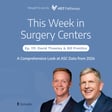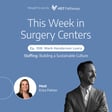
Joan Dentler – The Latest ASC Market Trends from Hospital Leaders
This week, our host, Nick Latz, sits down with Joan Dentler, Founder of Avanza Healthcare Strategies, to explore the insights from their 6th Annual Hospital Leadership ASC Survey. Together, they break down the survey results, uncovering key trends in ASC ownership, the growing interest from hospitals and health systems, the equity dynamics, and the role of third-party management companies. And the best part is that all these insights are backed by the data Joan and her team have aggregated and analyzed, so the takeaways are equal part interesting and meaningful.
After Nick’s conversation with Joan, we’ll switch to our Data & Insights segment. HST released our annual State of the Industry report in September, which analyzed client data from 590 surgery centers. Today I’ll share with you the numbers we were able to put together regarding Pre-Authorization Rates and Insurance Verification Rates, and we’ll look at how that compared to 2023.
Resources Mentioned:
- HST’s State of the Industry Report
- Avanza’s 6th annual Hospital Leadership ASC Survey will not be publicly available until January 2025. Please check their website for any updates: https://avanzastrategies.com.
Brought to you by HST Pathways.



















